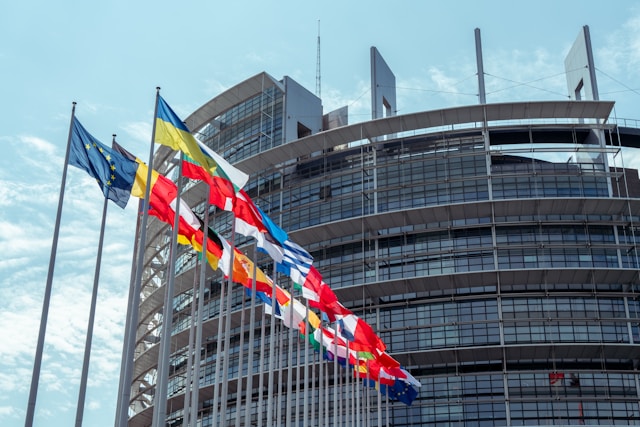
The EU Omnibus Simplification Package: An Explainer
No matter the industry, navigating the EU legislative landscape is no easy feat for most organisations, with new policies constantly requiring changes across multiple sectors of the economy. The willingness of Brussels to go back on already agreed laws, even for the reason of simplification, does not help either.
Announced by President Ursula von der Leyen last November, the EU Omnibus Simplification Package aims to reduce administrative burdens for European companies and give the bloc a competitive boost.
What will this mean for your business? Understanding these developments is key for any organisation operating in the EU, especially the ones who are or will soon be in direct scope of the Corporate Sustainability Reporting Directive and Corporate Sustainability Due Diligence. Many large companies are already preparing for compliance with these already adopted laws, and it’s important for them to anticipate what changes might be coming up, even though we are still missing many elements.
In this article, we bring you an overview of the Omnibus Package, detailing its expected impacts and what organisations can do to stay ahead of the changes on the horizon.
Want someone with deep experience and connections in the EU to help guide your sustainability strategy? Get in touch!
Contextualising of The Omnibus Package: What Makes it so Relevant For The EU
It’s no secret that the EU’s regulatory landscape is extremely complex, and that full compliance poses a challenge even for large and well equipped organisations. Feedback from stakeholders consistently points out administrative burdens as a significant business constraint, making it hard to guarantee efficiency and focus on innovation. Mario Draghi’s recent report on EU competitiveness has also served to further stress the well known fact that excessive administrative requirements represent an important obstacle to the EU’s economic success, especially when compared to global competitors such as the United States and China.
Tasked by the Council with the challenge of delivering a plan for 25% reduction in reporting requirements for EU companies by mid-2025, the Omnibus Simplification Package is one of the European Commission’s first steps in this direction.
What the EU Omnibus Simplification Package Entails
Set to be presented on 26 February 2025, the Package’s primary goal is to create a simpler framework to help stakeholders more easily comprehend and implement regulatory requirements. By addressing overlapping requirements, simplifying reporting and harmonising rules across Member States, the European Commission would like to see businesses focus on their growth, while still maintaining the high sustainability standards within EU legislation.
The term ‘omnibus’ refers to the Package’s focus on multiple, related but independent pieces of legislation and, in this case, the European Commission will target the Corporate Sustainability Due Diligence Directive (CS3D), the Corporate Sustainability Reporting Directive (CSRD), the EU Sustainable Finance Taxonomy and potentially other laws.
The package could include strategies and pathways, as well as proposals for concrete legislative changes, which will be further defined at a later stage. Although we do not anticipate a substantial revision of the texts, pressure from different stakeholders, as we will detail later in this article, could eventually steer things in a different direction.
Expected Impacts: What Changes With The Omnibus Package?
The Omnibus Package is envisioned by the European Commission to lead to:
- Harmonised Rules and Procedures – Businesses should encounter fewer discrepancies in the requirements established by EU policies, as well as in how these rules are applied across Member States, reducing confusion and fostering a more levelled playing field.
- Digitalisation of Compliance – A greater reliance on digital tools and platforms will facilitate faster and more transparent communication with EU authorities, making processes more efficient.
- Simplified Reporting Obligations – Consolidated reporting requirements will also save businesses time and resources, reducing mistakes and allowing them to focus on core activities.
At the same time, the worthy goals of regulatory alignment, streamlining and simplification could lead to unravelling of a number of important elements of the Green Deal architecture in the current political climate.
The reopening of negotiations (often with unpredictable outcomes) on key directives could weaken or undermine the essence of these laws. Depending on the depth of the proposed changes, the initiative could create a disadvantage for companies that have already heavily invested in compliance with existing legislation, particularly the CS3D and CSRD. The Package could complicate the transposition processes for the two directives and delay the development of necessary guidelines.
This measure could create even more unpredictability, which is harmful for businesses, as more pieces of the law might get affected, from the Sustainable Finance Disclosure Regulation (SFDR), Carbon Border Adjustment Mechanism (CBAM), REACH, Eco-Design Directive, Deforestation Regulation and Forced Labor Ban.
Next Steps: How To Stay Ahead of Upcoming Changes And Seize Opportunities
As usual, proactivity, participation and preparation are essential for those looking to leverage the opportunities offered by the Omnibus Simplification Package, so take note of these recommendations:
- Engage Strategically – Don’t miss out on the opportunity to participate in the legislative process and shape its outcomes. Be ready to participate in the Omnibus proposal consultation and engage with industry associations who might be preparing a position to share your inputs.
- Conduct Internal Audits – Assess your current compliance status in relation to the policies under the Package’s scope, with a specific focus on identifying overlaps. Use these insights for channeling into the policy-making process and creating efficiencies in preparation for compliance.
- Stay Informed – As with other legislations, businesses should actively monitor new developments and analyse any updates to understand how specific provisions of the Package may impact their sector. If your in-house team does not have the capacity to do so, you can reach out to dedicated consultancies such as Ohana to ensure that you have a clear picture of upcoming changes and how to address them.
Key Takeaways
The EU Omnibus Simplification Package could represent a significant step towards streamlining the EU’s complex regulatory framework and enhancing business competitiveness across sectors if shaped well. However, for the positive changes to manifest, it’s important to channel your positions to the policy-makers and keep track of the upcoming changes to ensure that your business will be ready to seize the opportunities.
If you would like expert guidance regarding the Omnibus Package or any other EU legislation, Ohana is here to help. Get in touch with us today to learn how our team can support you in developing the ideal strategy to future-proof your business, and set you up for success!
Want someone with deep experience and connections in the EU to help guide your sustainability strategy? Get in touch!
Join our newsletter to keep up to date with the latest news and information coming out of the EU.


